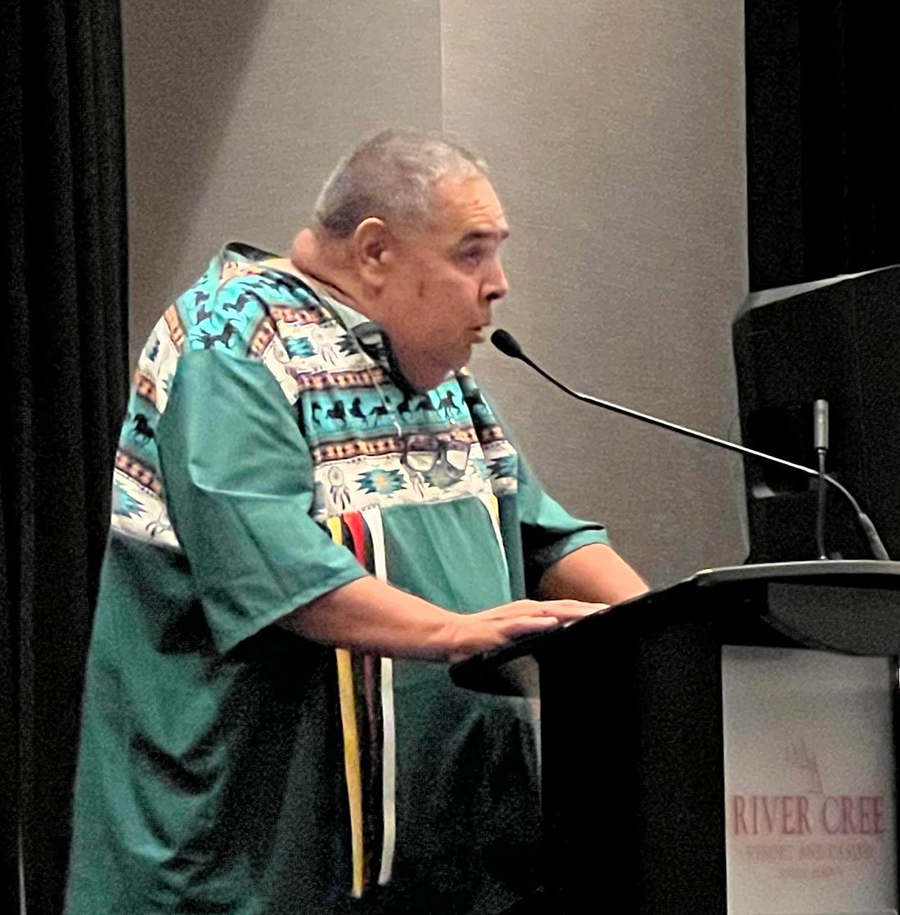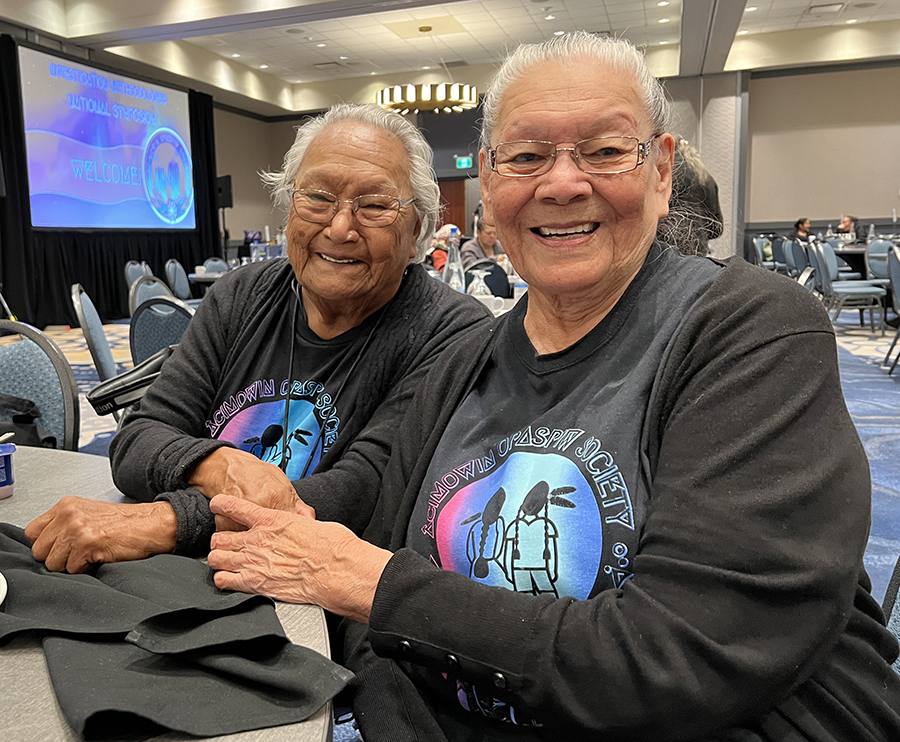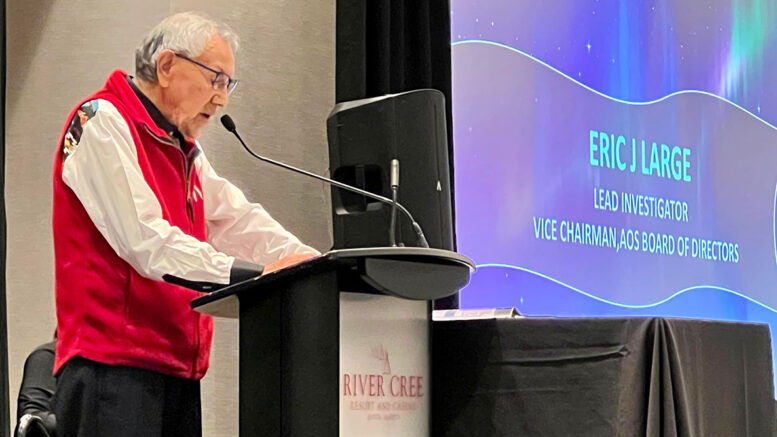by Kinnukana, Local Journalism Initiative Reporter
(ANNews) – The Acimowin Opaspiw Society (AOS) Investigation Methodologies National Symposium took place on September 26-28, 2023, at the River Cree Resort in Edmonton. The objective of the symposium was to bring together representatives from Indigenous communities across Canada to share information about investigating the unmarked graves of children who died at residential schools, build networks of teams to collaborate and work together, and to discuss ways to better support Residential School Survivors through this difficult process.
The symposium registration was sold out and approximately three hundred people attended. There were participants from many jurisdictions outside of Alberta, including British Columbia, Saskatchewan, Manitoba and Quebec. Councillor Jason Whiskeyjack, Saddle Lake Cree Nation and AOS Board of Director stated at the opening that “There’s a lot of work that needs to be done.
“There’s a lot of work that needs to be done, and it is one of my wishes that in the future, people right across Canada will share information and work together because we will be a lot stronger by doing so.”
In his opening comments Eric Large, Lead Investigator and AOS Director, also former Chief and Councillor of Saddle Lake, and Residential School Survivor, offered words of encouragement and reassurance to participants. He said ‘What you are doing here today is very honourable.
“What you are doing here today is very honourable. The content of these investigations is dramatic and hard and it’s okay to be sad. The goal of this symposium is to inspire community between our Nations in our investigations and the ones who we are doing this for. What our people have gone through will not define us. We have each other and people we can depend on and that is what I am seeing today.’
The symposium offered great insight to participants on a variety of topics that must be considered when working on an Investigation. The symposium began with an International update from Ron Lameman, President, International Indian Treaty Council. Ron spoke about when the United Nations Declaration on the Rights of Indigenous Peoples (Bill C-15) was passed, “Remember that Canada, United States, Australia and New Zealand voted against it.” This is a reminder of the continued challenges that Indigenous people face in Canada today.

Saddle Lake Nation Councillor Jason Whiskeyjack. Photo by Kinnukana.
Sheila North, Director of International Commission of Missing Persons (ICMP) shared that ICMP has a technical arrangement, Residential Schools Project, with Canada, signed in January 2023. Through the arrangement an Expert Roundtable will be established to create a strategy for National outreach and engagement, and they will host a closing gathering with stakeholders. The focus will be on information sharing, the rights of families, alignment with the Truth and Reconciliation Commission Calls to Action 72-79, alignment with Bill C-15 and international human rights instruments.
Updates were provided by Jeanette Jules, on the Kamloops Investigation and Florence Loyle, IRS Lead on the Youville Residential School. Jeanette said, “We need to look at what was the role of the RCMP in removing all the children. We are told that the RCMP was legislated to do it. We have to get away from the words ‘it was legislated,’ we have to change the mindset and the legislation across this country on how our children and people are treated.”
Participants were given a number of presentations related to research and information sharing, including topics such as Secure IT Infrastructure, Access to Restricted Church Records and First Nations Research Ethics and Translating Church Records from French. Leah Redcrow, Chief Executive Officer of AOS said, “We have to find a way to move forward.
“We have to find a way to move forward. We also have to find a way to get information. The only way to do that is to operationalize ourselves and work with the churches. Those are the only institutions that have those proper documents that will tell you when a child dies and where they are buried. If a child is not in one of the historical burial records and we don’t know where their bodies are, that is how we determine our missing children.”
Once the information is collected, the proper analysis and data sovereignty and protection is also key.

Residential School Survivors Eva Cardinal and Aldina Matoosk (Annie Cryer). Photo by Kinnukana.
There are various ground search methods that are being used to investigate unmarked graves and investigators rely on experts to recommend the best methods. Participants had an opportunity to hear from Dr. Scott Hamilton of Lakehead University. Dr. Hamilton has expertise in Global Positioning Systems, Geographic Information Systems, near surface geophysics, aerial and underwater drones, sonar, and 3D modelling. In his research, Dr. Hamilton deploys non-invasive data recovery to help preserve historic sites.
The most important part of these investigations is to provide Residential School Survivors with an opportunity to share their stories and to help lead the investigations with direct knowledge of what took place. Survivors require a safe setting in order to share their heart breaking stories, and they require ongoing mental health supports. Emily Delver, the Cultural Wellness Lead at AOS provided a session to participants on Mental Health First Aid. It is important for both the survivors and the people working on the investigations.
There are numerous investigations being undertaken across Canada and many are at different phases of work. This symposium helped everyone to share critical expertise, build supportive networks and collaborative working relationships, especially for those Survivors that not only had to endure being taken away from their families, communities and culture, but are now having to also find children and relatives that didn’t survive.



Be the first to comment on "Symposium asks Investigators Of Unmarked Graves At Residential Schools To Work Together Across Canada"